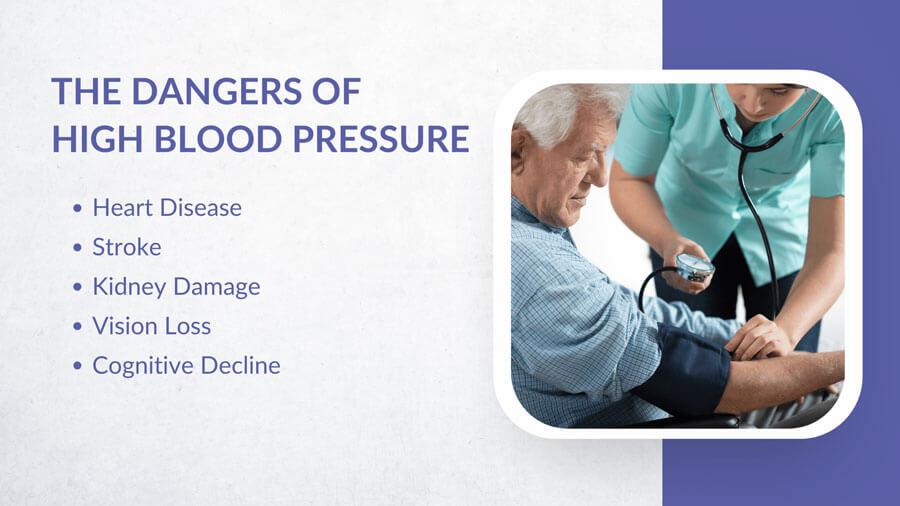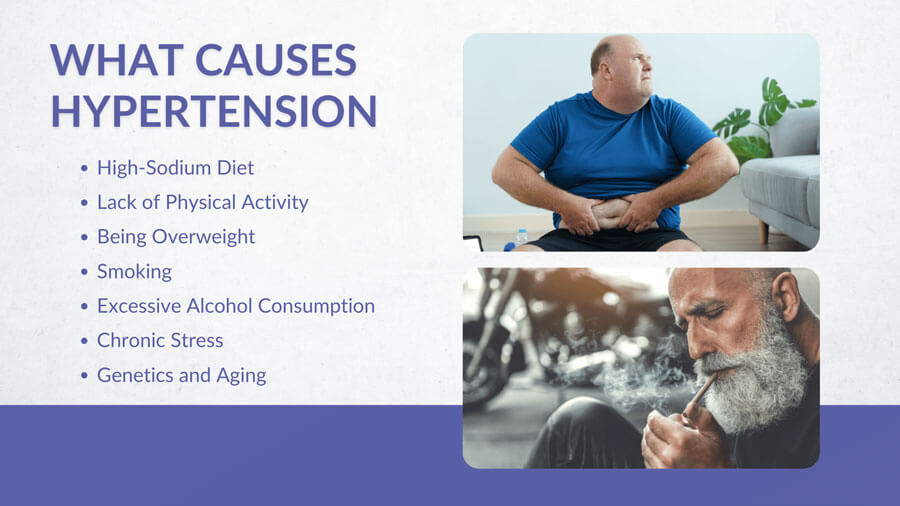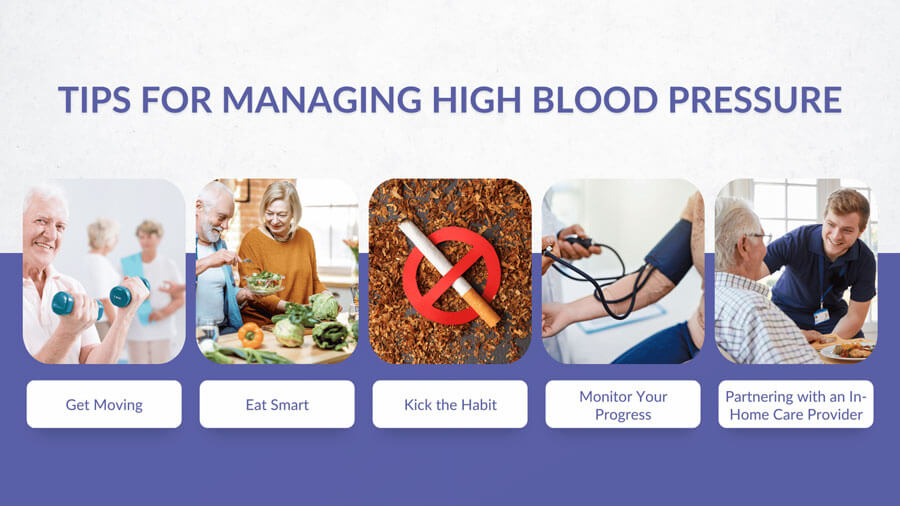Heart Health: Tips for Managing Hypertension

As we age, taking care of our hearts becomes even more crucial. High blood pressure, also known as hypertension, is a silent but serious threat to heart health. It occurs when the force of blood against your artery walls is consistently too high, potentially leading to heart attacks, strokes, vision loss, and other severe conditions.
Why Hypertension is a Big Deal
Many older adults might not realize they have high blood pressure since it often has no symptoms. Regular check-ups are vital to catching hypertension early. Readings of 130/80 or higher usually indicate a problem. While medication can help, lifestyle changes play a significant role in keeping your blood pressure in check.
The Dangers of High Blood Pressure

High blood pressure, or hypertension, can lead to several serious health problems, especially for older adults. Here’s a simple breakdown of the risks:
Heart Disease
When your blood pressure is high, your heart has to work harder to pump blood. Over time, this can make your heart and arteries stiff and narrow, leading to:
- Heart Problems: You might experience chest pain, shortness of breath, or even heart attacks because your heart isn’t getting enough blood.
- Heart Failure: Your heart can get too weak to pump blood well, causing fatigue and swelling in your legs and feet.
Stroke
High blood pressure is a leading cause of strokes, which happen when blood flow to part of your brain is blocked or when a blood vessel in your brain bursts. This can cause:
- Blood Clots: High blood pressure can lead to clots that block blood flow to your brain.
- Bleeding in the Brain: High pressure can make blood vessels in your brain burst, leading to bleeding and brain damage.
Both types of strokes can cause severe problems like difficulty speaking, paralysis, and even death.
Kidney Damage
Your kidneys filter waste from your blood. High blood pressure can damage the blood vessels in your kidneys, making it harder for them to do their job. This can lead to:
- Kidney Problems: Over time, your kidneys may also stop working, causing waste to build up in your body.
- Kidney Failure: In severe cases, your kidneys might stop working entirely, which can be life-threatening and might require treatments like dialysis.
Vision Loss
High blood pressure can harm the tiny blood vessels in your eyes, leading to:
- Blurry Vision: Damage can cause fluid to leak into your eyes, making your vision blurry.
- Blindness: In severe cases, you might lose your vision completely.
Cognitive Decline
There’s a connection between high blood pressure and brain health. High blood pressure can lead to:
- Memory Problems: Reduced blood flow to your brain can cause memory loss and confusion.
- Dementia: Long-term high blood pressure can increase the risk of dementia, affecting your ability to think, remember, and make decisions.
By understanding these risks, you can take steps to manage your blood pressure through lifestyle changes, regular monitoring, and working with your doctor. Keeping your blood pressure in check is essential for maintaining your overall health and well-being.
What Causes Hypertension?

High blood pressure, or hypertension, can be influenced by various factors. Here’s a closer look at some of the common causes:
High-Sodium Diet
Overeating salt can make your body retain water, which increases the volume of blood in your bloodstream. This extra volume raises blood pressure. Common sources of high sodium include:
- Processed foods like canned soups, chips, and frozen meals
- Restaurant and fast food
- Salty snacks and condiments
Lack of Physical Activity
Regular exercise helps keep your heart and blood vessels healthy. Without enough physical activity, your heart has to work harder to pump blood, which can increase blood pressure. Sedentary lifestyles can also contribute to weight gain, another risk factor for hypertension.
Being Overweight
Carrying extra weight puts added pressure on your heart and blood vessels. The more you weigh, the harder your heart has to work to pump blood, which can raise blood pressure. Maintaining a healthy weight through diet and exercise can help manage blood pressure.
Smoking
The chemicals in tobacco can damage your blood vessels and narrow your arteries, increasing blood pressure. Smoking also decreases the oxygen in your blood, making your heart work harder to supply oxygen to your body.
Excessive Alcohol Consumption
Drinking too much alcohol can raise your blood pressure. It can also lead to weight gain, which further increases the risk of hypertension. To keep your blood pressure in check, it’s important to limit alcohol intake.
Chronic Stress
Stress can temporarily raise your blood pressure by making your heart beat faster, and your blood vessels tighten. Over time, chronic stress can contribute to long-term high blood pressure if you cope with stress in unhealthy ways, such as overeating, drinking alcohol, or smoking.
Genetics and Aging
Your family history and age play a significant role in your risk for hypertension. If your parents or close relatives have high blood pressure, you’re more likely to develop it. As you age, your blood vessels naturally become less flexible, which can contribute to increased blood pressure.
Tips for Managing High Blood Pressure

Get Moving
Aim for at least 30 minutes of moderate exercise most days of the week. Activities like walking, swimming, or dancing are excellent choices. Regular exercise helps control your weight, which is vital for managing blood pressure.
Eat Smart
Reduce your salt intake to about 1,500 mg per day. Choose a well-balanced diet of fresh or flash-frozen fruits and vegetables, lean meats, and whole grains. Season your food with herbs and spices instead of salt.
Kick the Habit
If you smoke, quitting is one of the best things you can do for your heart. Smoking narrows your blood vessels and makes your heart work harder, increasing your risk of heart disease and stroke.
Monitor Your Progress
Regularly check your blood pressure and track your readings. Note what you did before each check, such as exercising or relaxing. Share this information with your doctor to better manage your condition.
Partner with an In-Home Care Provider
An in-home care provider can be a great ally in managing hypertension. They can help remind you to take medications, prepare heart-healthy meals, and encourage regular exercise. Plus, having a caregiver provides companionship and support as you navigate these lifestyle changes. Contact Always Best Care of Shreveport at (318) 431-8581 to learn more and schedule your free consultation.





